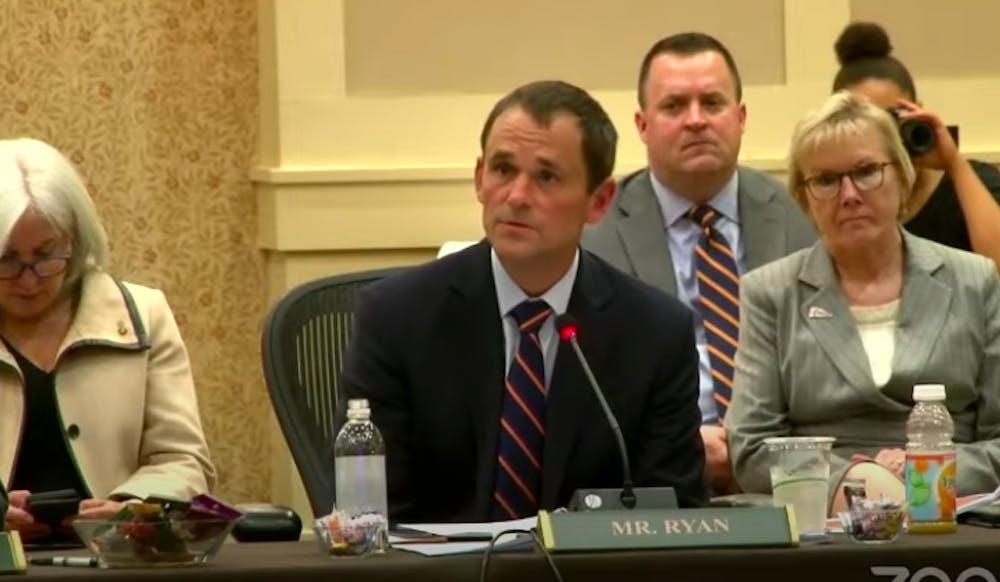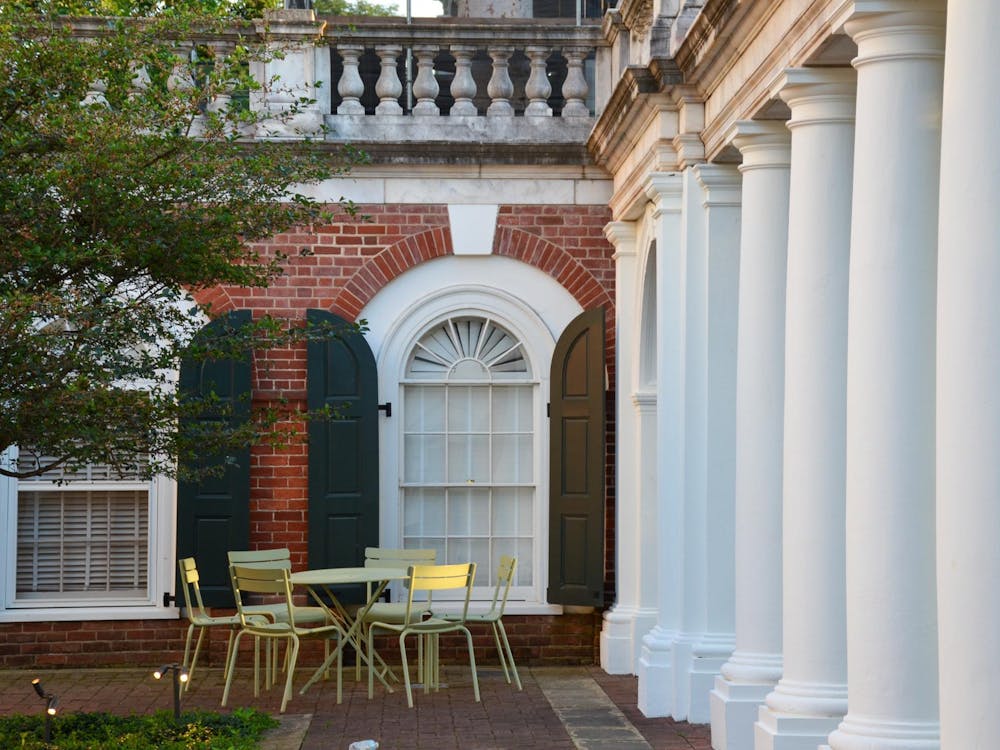The Board of Visitors voted to approve the Committee on Free Speech and Inquiry’s public statement on free expression at the University during a meeting of the full board held Friday afternoon. The Board was also updated on the 2030 Strategic Plan and heard remarks from the new student member of the Board.
Endorsement of the public statement on free speech and inquiry
The statement approved by the Board “unequivocally affirms” the University’s commitment to free speech and inquiry, pledging that all views, beliefs and perspectives should be considered without interference.
“This commitment underpins every part of the University’s mission,” the statement reads. “Free and open inquiry is the basis for the scientific method and all other modes of investigation that produce, expand, and refine knowledge. It is at the heart of the principles of academic freedom that protect faculty from interference with their research and their views.”
The statement specifies that the University should not prohibit or control free speech — rather, it should promote “mutual respect” and encourage those with contrasting views to engage with one another as “empathetic speakers and generous listeners.”
The Committee on Free Speech and Inquiry was created in February with the goal of writing a public statement outlining the roles of free expression and free inquiry in the University community. Ryan said that some individuals originally suggested that the University adopt the University of Chicago's free speech principles, but that given the University’s unique relationship with free speech due to its founder, he felt that an original statement would be more appropriate.
Ryan said that the committee sought input and conducted direct outreach to leaders of roughly 90 student organizations. Additionally, every member of the student body was emailed and invited to individual listening sessions with Mazzen Shalaby, former student member of the Board of Visitors and Class of 2021 Batten alumnus, and Dean of Students Allen Groves.
The Committee on Free Speech and Inquiry also held a two-hour listening session in May for students, alumni, parents and community members to articulate their own experiences and opinions on free speech within the University community. During the session, some faculty members expressed worry that the University no longer tolerates criticism while other participants said that they do not think all viewpoints have been treated fairly. All students and faculty were also invited to privately meet with Groves and Shalaby to discuss free speech on Grounds.
After presenting the statement to the Board, Ryan said he is “thrilled” with the outcome of the Committee on Free Speech and Inquiry’s work.
“I am confident that it reflects not just general values with respect to free speech and inquiry, but the special character and history of U.Va., and I'm pleased that it talks not just about the history in law, and our values, but also our aspirations and our commitment to each other to be empathetic speakers and generous listeners,” Ryan said.
Over the past year, the University has removed and restricted Lawn room door signage criticizing the University's history of enslavement and exclusivity. One sign put up in the fall contained the language “F—k UVA” and “UVA Operating Cost: KKKops, Genocide Slavery, Disability, Black and Brown Life,” causing some alumni and community members to call on the University to remove the signage. Following the initial backlash, other Lawn residents posted similar “F—k U.Va.” signs. New restrictions, which limit Lawn room signage to two message boards affixed to every door by Housing and Residence Life, were announced in February and will be enforced when the next residents move in.
Both current and future Lawn residents expressed frustration and disappointment with the new restrictions in interviews with The Cavalier Daily.
“Our signs, more than any other effort of this University, were honest and realistic about the violence of this institution and this space,” a collective statement by Lawn residents who posted the signs said. “We have and will continue to be more mindful about this space — in its history, meaning and position — than the University of Virginia has ever been. ”
Ryan addressed the “F—ck U.Va.” signs and new restrictions on Lawn room signage during the meeting of the full Board. While he noted that there have always been size limitations on signage for Lawn room doors, Ryan said that the University had never enforced it before and so removing signage simply because the University disagreed with the subject of the message would have violated the First Amendment.
“Prospectively, it's perfectly fine to have time, place and manner restrictions on the speech, and given the unique nature of the Lawn as both a place where students live — and the heart of the University — this is the way that we're trying to balance both of those values,” Ryan said.
Updates on the 2030 Strategic Plan
Ryan then updated the Board on the University’s 2030 Strategic Plan, a 10-year plan aimed at improving the University community through four goals — strengthening the University’s foundation, cultivating the most vibrant community in higher education, enabling discoveries that enrich and improve lives and making the University synonymous with service.
Ryan highlighted that the University has mapped out the plan for the landscape for the Emmett-Ivy corridor and approved designs for the hotel and conference center, launched the School of Data Science, announced the Karsh Institute of Democracy and opened new spaces like the Multicultural Student Center. The University will also open a new Student Health and Wellness Center in 48 days and plans to break ground on the Contemplative Commons.
In response to a question about how the pandemic has impacted the University’s ability to achieve goals outlined in the 2030 Strategic Plan, Ryan said that COVID-19 did put some longer-term projects on hold, such as the University’s plan to eventually house all second years on Grounds. Ryan estimated that this may take anywhere from seven to 10 years.
“In some respects, the pandemic has underscored the importance of some aspects of the strategic plan — items that we knew are important but now we realize just how important they are,” Ryan said.
Specifically, Ryan said that the pandemic has shown him the importance of both the student experience and teaching within the University community. Moving forward, Ryan said that some of the tools learned from the pandemic will influence what the University does to improve opportunities for teaching and that goals in the 2030 Strategic Plan that relate to the student experience should become critical.
Student member Sarita Mehta addresses the Board
Rising fourth-year College student Sarita Mehta also addressed the Board during her first official meeting as the student member of the Board of Visitors. Mehta said that she plans to prioritize student advising throughout her one-year tenure.
“Advising lays the foundation for the student experience and interaction with the University from day one,” Mehta said. “It plants seeds which are cultivated over four years. Robust advising has the potential to address pre-existing disparities in education and access to external support.”
Particularly as the pandemic has exacerbated the gaps in academic preparedness and students’ familiarity with the University, Mehta emphasized that advising has only become more critical. It is necessary to create a more encompassing and streamlined advising and guidance system that will influence students long after they have graduated, Mehta said.
Through her conversations with students so far, Mehta said that while there is uncertainty, she feels that students are overwhelmingly optimistic about returning to Grounds and returning to an in-person residential and academic experience.
“Today might be fleeting, but the promise of a great and good tomorrow is constant,” Mehta said.







